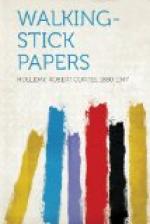England is an island; and though the British government controls one fifth, or something like that, of the habitable globe, England is a very small place. Most of the things there are small. A freight car is a goods van, and it certainly is a goods van and not a freight car. So when you ask what little stream this is, you are told that that is the river Lea, or the river Arun, as the case may be, although they look, indeed, except that they are far more lovely, like what we call “cricks” in our country. And the Englishman is fond of speaking in diminutives. He calls for a “drop of ale,” to receive a pint tankard. He asks for a “bite of bread,” when he wants half a loaf. His “bit of green” is a bowl of cabbage. He likes a “bit of cheese,” in the way of a hearty slice, now and then. One overhearing him from another room might think that his copious repast was a microscopic meal. About this peculiarity in the homely use of the language there was a joke in Punch not long ago. Said the village worthy in the picture: “Ah, I used to be as fond of a drop o’ beer as any one, but nowadays if I do take two or dree gallons it do knock I over!”
Into the matter of the quaint features of the speech of the English countryside, or the wonders of the Cockney dialect, the unlearned foreigner hardly dare venture. It is sufficient for us to wonder why a railroad should be a railway. When it becomes a “rilewie” we are inclined, in our speculation, “to pass,” as we say over here. And ale, when it is “ile,” brings to mind a pleasant story. A humble Londoner, speaking of an oil painting of an island, referred to it as “a painting in ile of an oil.”
An American friend of mine, resident in London, insists that where there is an English word for a thing other than the American word for it, the English word is in every case better because it is shorter. He points to tram, for surface-car; and to lift, for elevator. Still though it may be a finer word, hoarding is not shorter than billboard; nor is “dailybreader” shorter than commuter. I think we break about even on that score.
This, however, would seem to be true: where the same words are employed in a somewhat different way the English are usually closer to the original meaning of the word. Saloon bar, for instance, is intended to designate a rather aristocratic place, above the public bar; while the lowest “gin mill” in the United States would be called a “saloon.” I know an American youth who has thought all the while that Piccadilly Circus was a show, like Barnum and Bailey’s. With every thing that is round in London called a circus, he must have imagined it a, rather hilarious place.




